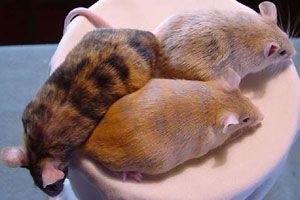
You might be wondering why it’s essential to focus on specific health concerns for brindle mice. Well, understanding their unique needs helps you catch potential issues before they become serious. Just like knowing when to water plants or trim branches, being proactive about your mouse’s health can lead to a long, fulfilling life—both for you and your pet. So, grab a cup of coffee, and let’s dive into the world of brindle mice health!
Common Health Issues in Brindle Mice
Understanding the health issues that can affect brindle mice gives you a clearer picture of how to care for them. These little critters can experience various problems, some of which are quite common among them. Among the most frequent health issues, you’ll find:
- Respiratory Problems: Mice are prone to respiratory infections caused by bacteria or environmental factors.
- Obesity: Overfeeding or lack of exercise can lead to obesity, affecting their overall health.
- Skin Issues: Skin mites or allergies can cause irritation and discomfort.
- Dental Problems: Overgrown teeth can lead to difficulty eating and other complications.
Let’s take a closer look at each of these issues so you can be better prepared.
Respiratory Problems
Respiratory issues in brindle mice usually manifest as sneezing, wheezing, or labored breathing. These conditions can arise from various factors, including poor ventilation, exposure to drafts, or ammonia buildup in their cage. In a way, it’s similar to how we react to moldy bread or dust—our noses can get stuffy, and we might cough.
To prevent respiratory problems:
– Maintain Clean Cages: Regularly clean their living environment to reduce ammonia and bacteria buildup.
– Provide Good Ventilation: Ensure their cage is well-ventilated, avoiding drafts while keeping the area fresh.
– Monitor for Symptoms: Keep an eye out for signs of distress, as prompt action can make a difference.
Obesity
Just like us, brindle mice can pack on the pounds if they aren’t careful. Obesity can lead to various health issues, including diabetes and heart problems. It’s like letting a plant grow wild without trimming—it may look lush but can become unmanageable.
To keep your brindle mouse fit:
– Portion Control: Follow recommended feeding guidelines and measure their food for accuracy.
– Encourage Exercise: Provide toys and tunnels to encourage them to move around.
– Limit Treats: Treats are great but should be given sparingly to avoid weight gain.
Skin Issues
Brindle mice can also face skin-related problems, such as mites or allergies. These conditions may cause itching, redness, or hair loss. Think of it like a bad case of poison ivy—unpleasant and uncomfortable.
To prevent skin issues:
– Regular Checks: Regularly inspect your mouse for signs of irritation or unusual behaviors like excessive scratching.
– Cleanliness Matters: Ensure their bedding is clean and free from irritants, and choose materials that suit their sensitivities.
– Consult a Vet: If you notice persistent skin problems, don’t hesitate to consult a vet for appropriate treatment.
Dental Problems
Dental issues arise when a mouse’s teeth grow too long, which can happen if they’re not chewing on the right things. Overgrown teeth can lead to pain and difficulty eating. It’s like having a splinter that keeps getting worse if left untreated.
To avoid dental problems:
– Provide Chewing Options: Include chew toys, wood blocks, or specially designed dental treats in their diet.
– Monitor Their Eating Habits: Pay attention to how they eat; if they struggle, it might be time for a vet visit.
– Regular Dental Checks: Familiarize yourself with their teeth and perform routine checks to catch problems early on.
Importance of a Balanced Diet
A balanced diet is crucial for preventing many health issues in brindle mice. Just like us, proper nutrition lays the foundation for overall health. Imagine trying to build a house on shaky ground—without the right support, things can easily fall apart.
To ensure your brindle mouse has a well-rounded diet:
– Quality Pellets: Offer high-quality commercial mouse pellets as the main staple of their diet.
– Fresh Fruits and Vegetables: Supplement their diet with small amounts of fresh fruits and veggies for added nutrients.
– Limited Sugary Treats: Just like us, mice can have a sweet tooth, but keep sugary treats to a minimum to avoid health problems.
Hydration Matters
Access to fresh, clean water is also vital for your brindle mouse’s health. Dehydration can lead to serious complications, so always ensure their water bottle is filled and clean. Think of it as keeping a garden hydrated—without proper watering, plants can wilt and fail to thrive.
Creating a Healthy Environment
The environment you create for your brindle mouse plays a big role in their overall health. A well-maintained living space can help alleviate many potential problems.
Here are some important aspects to consider:
– Cage Size: Make sure the cage is spacious enough for them to explore and exercise. A cramped space can lead to stress and health issues.
– Bedding: Use soft, non-toxic bedding materials that are comfortable and safe.
– Temperature Control: Keep their living environment at a comfortable and stable temperature, avoiding extremes.
Regular Vet Checkups
Lastly, regular veterinary checkups can make a significant difference in spotting health issues early. Just like we go for annual physicals, mice benefit from routine visits to nip any problems in the bud. You might think, “But my mouse seems healthy!”—and while that may be true, preventive care is always a smart move.
Final Thoughts on Brindle Mouse Health
Caring for brindle mice involves understanding their unique health needs and providing a supportive environment. By focusing on prevention, you can help your furry friends avoid common health issues and lead happier, healthier lives. Remember, small changes in diet, exercise, and regular health checks can have a lasting impact.
The journey of pet ownership is filled with learning and love, and taking steps to maintain your brindle mouse’s health will enrich that experience. Treat them like the vibrant little creatures they are, and enjoy every moment you spend together.
